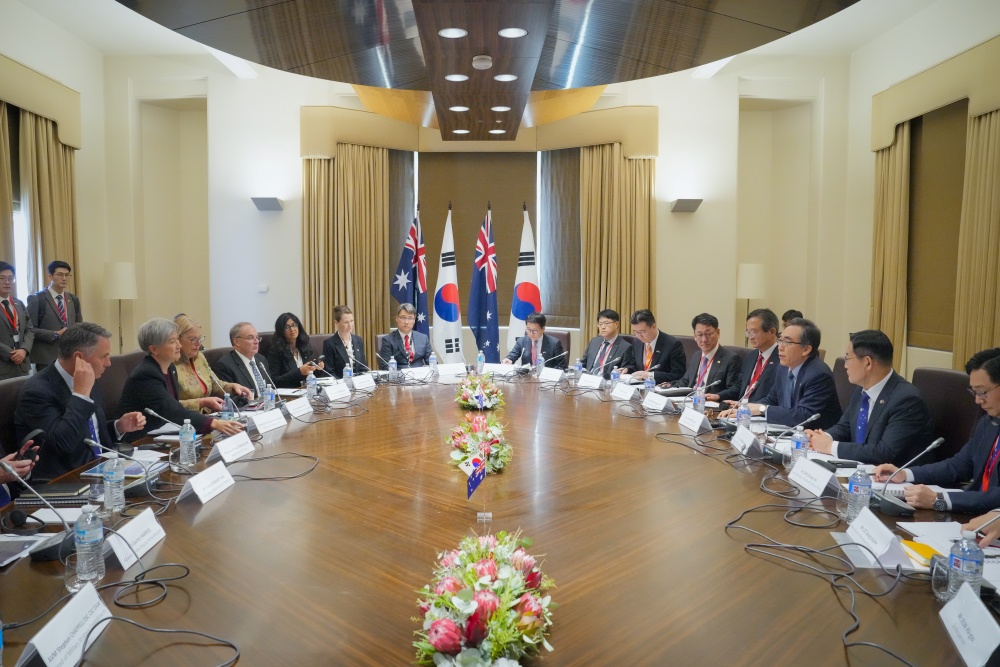-
About the Ministry
About the Ministry
- Press
- Countries & Regions
- Policy Information
- Life In Korea
Ministry News
- Notices
- Ministry News
- Press Releases
- Press Briefings
- Speeches & Published Materials
- Newsletter Service
- Diplomatic White Paper
Sixth ROK-Australia Foreign and Defense Ministers’ (2+2) Meeting
- Date
- 2024-05-07
- hit
- 11875

Minister of Foreign Affairs Cho Tae-yul and Minister of National Defense Shin Won-sik, along with Australian Deputy Prime Minister and Minister for National Defense Richard Marles and Minister for Foreign Affairs Penny Wong, held the sixth ROK-Australia Foreign and Defense Ministers’ (2+2) Meeting in Melbourne, Australia, on Wednesday, May 1. They exchanged in-depth views on topics including Indo-Pacific strategies, cooperation in defense and defense industries, the Korean Peninsula, and regional affairs. Following the meeting, the Ministers from the two countries held a joint press conference and adopted a joint statement outlining the outcomes of the meeting.
This meeting was especially meaningful as it marked the first 2+2 meeting since the inauguration of both governments and the announcement of the ROK’s Indo-Pacific Strategy, and was held in Melbourne, adjacent to the defense production facility under construction by a Korean company.
The Ministers from the two countries shared the understanding that the noble dedication of the 17,164 Australian veterans who fought alongside the ROK in the Korean War has served as a solid foundation on which Korea and Australia could deepen their cooperative relationship as ”Comprehensive Strategic Partners.” The two sides agreed to further advance their cooperative ties in a more strategic and future-oriented direction, based on the fundamental value of liberal democracy and a shared vision of regional and global affairs.
The two sides agreed that they are each other’s key partners in advancing their respective Indo-Pacific strategies and committed to continuing close bilateral, minilateral, and multilateral cooperation as like-minded countries in the Indo-Pacific region.
The two sides highly appreciated the remarkable advances in bilateral cooperation in defense and defense industries, including the conclusion of a contract between Australia and a Korean company toward the end of last year for the latter to supply next-generation infantry fighting vehicles to the former, and the large-scale participation of the ROK military in the “Talisman Sabre” exercise held in Australia last year.
In particular, the two sides drew the understanding that mutually beneficial cooperation in the defense industry, including the production of K-9 self-propelled howitzers and Redback Infantry Fighting Vehicles in Australia, will contribute substantially not only to strengthening the power of the Australian military but also to the domestic economic development of both countries. On that note, the ROK side actively explained the excellence of Korean-built frigates to Australia, as the latter is pursuing a frigate project.
Regarding the Korean Peninsula, the two sides expressed concern over North Korea posing a threat to peace and stability on the Korean Peninsula and beyond through its nuclear development and missile launches, and definition of inter-Korean relations as those between “hostile and belligerent states” as well as its illegal military cooperation with Russia. The two sides shared the view that it is important for the international community to make united responses and collaborate, and agreed to work closely together to drive this forward. They also agreed that it is important to send a clear message to North Korea and to make continued efforts to block North Korea’s revenue generation for its nuclear development such as through cyber activities and ship-to-ship transfers.
Furthermore, the two sides affirmed their commitment to closer cooperation in the engagement in the ASEAN and Pacific regions, both of which they consider to be important. They also agreed to expand mutually beneficial cooperation in comprehensive security such as cyber security, economic security including energy and critical minerals, as well as in core technologies and climate change, among others.
Moreover, the two sides discussed the situation in the Indo-Pacific region, shared concerns regarding the current situation in the Middle East and the war in Ukraine, and agreed to continue strengthening cooperation including through continued provision of humanitarian assistance to those regions.




